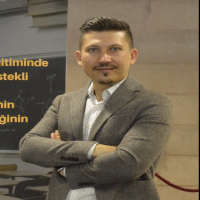Research Article
Systematic Reviews and Meta Analysis
Systematic Reviews and Meta Analysis
1. A Content Analysis on Theses Related to Inquiry-Based Learning ApproachIssue Reviewers

Adı ve Soyadı: Abdullah EKER
Doğum Tarihi ve Yeri: 31 Ekim 1982– KAYSERİ
Medeni Durumu: Evli – 2 çocuk babası
Tel: 05392111711
E-mail:aeker38@gmail.com
Yabancı Dili: İngilizce – KPDS: 68
2. Öğrenim Durumu
Derece Bölüm/Program Üniversite Yıl
Lisans Özel Eğitim Bölümü Üstün Zekâlılar Öğretmenliği Programı İstanbul Üniversitesi,
Hasan Ali Yücel Eğitim Fakültesi 2009
Y. Lisans Özel Eğitim Anabilim Dalı
Üstün Zekâlıların Eğitimi Programı Anadolu ÜniversitesiEğitim Bilimleri Enstitüsü
Tez Danışmanı: Prof. Dr. Uğur SAK
Tez Başlığı: Yaratıcı Zıt Düşünme Tekniğinin Sosyal Geçerliği 2013
Doktora Özel Eğitim Anabilim Dalı
Özel Eğitim Programı Necmettin Erbakan Üniversitesi
Eğitim Bilimleri Enstitüsü
Tez Danışmanı: Prof. Dr. Hakan SARI
Tez Başlığı: Özel Yeteneklilerle Çalışan Öğretmenler için Hazırlanan Öğretmen Eğitim Programının Etkililiği 2020
3. İş Tecrübesi
Görev Unvanı Görev Yeri Yıl
Stajyer Öğretmen Beyazıt Ford Otosan Üstün Yetenekliler Pilot Uygulama İlköğretim Okulu 2007-2009
Araştırma Görevlisi Eğitim Fakültesi/Anadolu Üniversitesi 2012-2013
Araştırma Görevlisi Muallim Rıfat Eğitim Fakültesi
Kilis 7 Aralık Üniversitesi 2013-2015
Araştırma Görevlisi Ahmet Keleşoğlu Eğitim Fakültesi
Necmettin Erbakan Üniversitesi 2015- 2020
Doktor Muallim Rıfat Eğitim Fakültesi
Kilis 7 Aralık Üniversitesi 2020 – Devam ediyor


Lisans eğitimini Bilkent Üniversitesi Psikoloji bölümünde; yüksek lisans eğitimini Gelişim Psikolojisi alanında Orta Doğu Teknik Üniversitesinde; doktora eğitimini Ankara Yıldırım Beyazıt Üniversitesinde tamamlamıştır. Duygusal gelişim, çocuklarda duygu tanıma ve duygu düzenleme, ana-babalık tutumları, internet bağımlılığı, yabancılara yönelik tutumlar, önyargıları azaltma konusunda müdahale
programları, kültürlerarası psikoloji ve iletişim alanlarında çalışmalarını yürütmektedir. Çankırı Karatekin Üniversitesi Psikoloji bölümünde görev yapmaktadır.




Fuat Elkonca, lisans eğitimini 2007 yılında Konya Selçuk Üniversitesi Matematik bölümünde tamamlamış ve 2007 ile 2011 arasında çeşitli kurumlarda Matematik öğretmenliği yapmıştır. 2013’te Van Yüzüncü Yıl Üniversitesi, Eğitimde Ölçme ve Değerlendirme bilim dalında yüksek lisans eğitimini ve 2020 yılında Gazi Üniversitesi Eğitimde Ölçme ve Değerlendirme bilim dalında doktora eğitimini tamamlamıştır. Dr. Elkonca 2020 yılından beri Muş Alparslan Üniversitesi Eğitimde Ölçme ve Değerlendirme ABD’de Dr. Öğr. Üyesi olarak görev yapmaktadır. Genel olarak Eğitsel Veri Madenciliği ve Kümeleme Analizi ile ilgili çalışmalar yürütmekte ve bunlara ek olarak Madde Tepki Kuramı, Klasik Test Kuramı ve Çok değişkenli istatistik ile ilgili çalışmalar yapmaktadır. Ölçme ve Değerlendirme alanın yanında disiplinler arası çalışmalarla ilgilenmekte ve özellikle okul öncesi eğitimi, çocuk gelişimi ve özel eğitim alanında birçok proje ve kitap çalışmasında yer almaktadır. İstatistiksel analizler bağlamında birçok program kullanabilen Elkonca; SPSS, LISREL, Mplus, Latent Gold, NVivo gibi birçok istatistik paket programını ileri düzeyde kullanabilmektedir.


Assoc. Prof. Dr. Mahmut Çitil was born in Afşin in 1981. He graduated from the Department of Special Education at Ankara University, Faculty of Educational Sciences, in 2004. Between 2004 and 2010, he worked within the Directorate General of Special Education and Guidance Services and the Turkish Ministry of National Education (MoNE), serving in various special education schools. In 2009, he completed his master’s degree at the Institute of Educational Sciences of Gazi University. He began his PhD studies in the Sociology of Education at Ankara University’s Institute of Educational Sciences in 2010 and completed the program in 2016. Concurrently, he pursued a second doctoral degree at Gazi University’s Institute of Educational Sciences, Department of Special Education, specializing in gifted education, which he also completed in 2016. In 2021, he was awarded the title of Associate Professor in the field of gifted education.
Assoc. Prof. Dr. Çitil continues his scholarly work in the areas of gifted children and their education, the history of special education, educational policies and legal developments, the sociology and history of education, and the sociology of disability. He also delivers training sessions and seminars and provides academic consultancy in the field of gifted education to public institutions—particularly the Ministry of National Education—Science and Art Centers, and relevant non-governmental organizations. Since 2010, he has been serving as a faculty member in the Department of Special Education at Gazi University, Gazi Faculty of Education, and since 2020, he has held the position of Head of the Department of Gifted Education.



Dr. Sertaç Arabacıoğlu, fen bilimleri öğretmenlerinin sürekli mesleki gelişimini destekleme, izleme ve değerlendirmeye yönelik yenilikçi yaklaşımlar üzerine çalışmalar yürütmektedir. STEM alanlarının bilim eğitimine entegrasyonu, sorgulama temelli bilim eğitimi, etkinlik temelli doğa eğitimi ve robotik gibi pek çok alanda uygulamalı atölyeler, hizmet içi eğitim programları ve bilim kamplarında görev almıştır. Halen Muğla Sıtkı Koçman Üniversitesi, Eğitim Fakültesinde Araştırma Görevlisi olarak görev yapmakta, bunun yanı sıra bilimi toplumla bütünleştirmeyi hedefleyen Muğla Sıtkı Koçman Üniversitesi Bilim Eğitimi Uygulama ve Araştırma Merkezinin Müdür Yardımcılığı görevini yürütmektedir.

Yüksek lisans (2017) ve doktorasını (2022) Marmara Üniversitesi Eğitim Bilimleri Enstitüsünde tamamlayan Veysi AKTAŞ, Sosyal Bilgiler Eğitimi alanında çalışmalar yürütmektedir. Ağırlıklı olarak Sosyal Bigliler Öğretimi, Okul Dışı Öğrenme, Müze Eğitimi, Sanal Müze gibi alanlarda araştırmalar yürüten yazar; 2023'te Doç. Dr. ünvanını almıştır. 2012'den beri Milli Eğitim Bakanlığı bünyesinde Sosyal Bilgiler öğretmeni olarak çalışmaktadır.


Çağatay Benhür, 10.06.1974 tarihinde Ankara’da doğdu. 1992 yılında Ankara Bahçelievler Deneme Lisesinden mezun oldu. 1993-1997 tarihleri arasında Selçuk Üniversitesi Fen Edebiyat Fakültesi Tarih Bölümünde eğitim gördü. 1998-2001 tarihleri arasında Selçuk Üniversitesi Sosyal Bilimler Enstitüsü Atatürk İlkeleri ve İnkılap Tarihi Bilim Dalında yüksek lisansını tamamladı. 2001-2008 tarihleri arasında Selçuk Üniversitesi Sosyal Bilimler Enstitüsü Atatürk İlkeleri ve İnkılap Tarihi Bilim Dalında doktora eğitimi gördü. 1998-2009 yılları arasında Selçuk Üniversitesi Fen-Edebiyat Fakültesi Tarih Bölümünde Araştırma Görevlisi olarak çalıştı. 2009 yılından beridir de Selçuk Üniversitesi Edebiyat Fakültesi Tarih Bölümünde öğretim üyesi olarak görev yapmaktadır (2024 yılından beri Profesör). Bu arada 2002-2003 öğretim yılında Ukrayna Simferopol Pedagoji Üniversitesi Türkoloji Bölümünde konuk öğretim görevlisi olarak çalıştı. Kazakistan Kızılorda Korkut Ata Üniversitesi’nde dersler verdi. Berlin Freie Üniversitesi ve Prag Karlova Üniversitelerinde araştırmacı olarak bulundu. Askerliğini, Bursa İl Jandarma Alay Komutanlığında 2009 yılında kısa dönem olarak yaptı. İngilizce ve Rusça bilen Çağatay Benhür, evli ve 2 çocuk sahibidir.


Aim & Scope
Ahmet Keleşoğlu Faculty of Education Journal (AKEF Journal) was established in 1987 to serve the dissemination of academic studies that offer concrete solutions to problems at all levels of education from preschool to higher education, and that aim to contribute to the professional development of teachers and academics. For this purpose, our journal includes researches that can provide resources for national and international literature in the field of teacher training in our country and around the world.
Ahmet Keleşoğlu Faculty of Education Journal (AKEF Journal), which is a pioneer in our country by managing the article acceptance and publication processes is an international refereed journal published electronically in March and September, free of charge, open to access, in accordance with the principles of double-blind refereeing. The language of the journal is Turkish and English, and there is an extended summary in English for studies conducted in Turkish.
*** The file formats of the old issues of our journal are rearranged. Access to these issues will be made available in the archive section of our journal as soon as possible.
JAKEF includes theoretical and applied academic studies on current issues and problems related to education as well as educational sciences, primary education, secondary education and higher education field education and special education, and original, qualitative, quantitative and mixed method research-based publications in different areas of Teacher Training. Studies that do not comply with this scope will not be included in the evaluation process.
JAKEF journal, theoretical or applied studies in the following areas are evaluated for publishing;
Physical Education and Sports Education
Computer Education and Instructional Technology
Biology Education
Geography Education
Religious Culture and Moral Knowledge Education
Education Programs and Teaching
Educational Sociology
Education Management and Supervision
Measurement and Evaluation in Education
Philosophy Group Training
Science Education
Physics Education
Visual Arts Education
Chemistry Education
Mathematics Education
Vocational and Technical Education
Museum Education
Music Education
Good Practices for Teachers
Teacher Training
Preschool Education
Special Education
Psychological Guidance
Art and Design Education
Classroom Training
Social Studies Education
History Education
Technology and Design Education
Turkish Language and Literature Education
Turkish Education
Distance Learning
Foreign Language Education
Creative Drama Education
Lifelong Learning
Author Guidelines
Ethical Principles and Publication Policy
Publication ethics and principles
Ahmet Kelesoglu Journal of the Faculty of Education (Akef Journal) is committed to applying publication ethics to the highest standards and complying with the following principles of publication ethics. These principles are based on recommendations and guidelines developed by the committee on Publication Ethics (COPE) and council of Science Editors (CSE), for journal editors.
Ahmet Kelesoglu Journal of the Faculty of Education (Akef Journal), all stakeholders are expected to carry ethical responsibilities within the scope of publication ethics. In this context, Akef Journal undertakes to follow the Code of Conduct and the Principles of Transparency and best Practice prepared by COPE (publication Ethics Committee). Follow The Cope Guidance for Editors is within the responsibility of the editors and the COPE Ethical Guidelines for Peer Reviewers must be followed by the journal reviewers.
Ahmet Keleşoğlu Journal of the Faculty of Education (Akef Journal) the publication processes applied are the basis for the development and distribution of information in an impartial and respected manner. The processes implemented in this direction are directly reflected in the quality of the work of the authors and the institutions that support the authors. Peer-reviewed studies are studies that embody and support the scientific method. At this point, it is important that all stakeholders of the process (authors, readers and researchers, publishers, reviewers and editors) comply with the standards of ethical principles.
1. GENERAL ACTIONS CONTRARY TO SCIENTIFIC RESEARCH AND PUBLICATION ETHICS
a) plagiarism: showing the original ideas, methods, data or works of others as their own work in part or in whole without attribution in accordance with scientific rules,
b) forgery: using data that does not actually exist or is falsified in Scientific Research,
c) distortion: falsifying research records or data obtained, showing that devices or materials not used in research were used, falsifying or shaping research results in the interests of people and organizations receiving support,
d) re-publication: presenting duplicate publications as separate publications in academic appointments and promotions,
d) slicing: to present these publications as separate publications in academic appointments and promotions by dividing the results of a research into pieces in such a way as to disrupt the integrity of the research and in an inappropriate way and publishing them in more than one number,
e) unfair writing: among people without the active contribution of writers to include, or avoid including people with author ranking in a manner unbecoming and unjustified change, the names of those who actively contribute to the next edition of the works out, using its influence to write in the name of the active without the contribution of,
(2) other types of ethical violations include:
a) do not specify the person, institution or organizations that support and their contributions in publications made as a result of research conducted with support,
b) to use dissertations or works that have not yet been submitted or accepted by defense as sources without the permission of the owner,
c) do not follow ethical rules in research on humans and animals, do not respect the rights of patients in their publications,
d) act in violation of the provisions of the relevant legislation in biomedical research and other clinical research related to humans,
d) to share the information contained in a work that it has been commissioned to study with others before publication without the express permission of the owner of the work,
e) use of resources, Places, facilities and devices provided or allocated for Scientific Research,
f) falsely, unwarranted and wilfully alleging ethical violations,
d) publish the data obtained without the explicit consent of the participants in the survey and attitude research conducted as part of a scientific study, or if the research will be conducted in an institution, also without the permission of the institution,
d) damage to animal health and ecological balance in research and experiments,
h) in research and experiments, do not obtain in writing the permissions that must be obtained before starting the work from the authorized units.
(I) conduct research and experiments in violation of the provisions of the legislation or international conventions to which Turkey is a party on relevant research and experiments.
(i) failure to comply with the obligation of researchers and authorities to inform and warn interested persons about possible harmful practices in relation to scientific research,
j) do not use data and information obtained from other persons and institutions in scientific studies to the extent and manner permitted, do not comply with the confidentiality of this information and do not ensure its protection,
k) making false or misleading statements regarding scientific research and publications in academic appointments and upgrades, (YÖK directive on scientific research and publication ethics, Article 4)
In accordance with the ethical rules; research that requires the permission of the Ethics Committee for evaluation in the journal is as follows:
1. All kinds of research carried out with qualitative or quantitative approaches that require data collection from participants using survey, interview, focus group work, observation, experiment, interview techniques,
2. Use of humans and animals (including material/data) for experimental or other scientific purposes,
3. Clinical trials on humans,
4. Studies on animals,
5. Retrospective studies in accordance with the personal data protection act.
In this context, the studies to be evaluated in our journal;
1. Stating that “illuminated consent form”has been obtained in case reports,
2. Obtaining and specifying permission from the owners for the use of scales, surveys, photographs belonging to others,
3. It is necessary to indicate that copyright regulations are complied with for the ideas and works of art used.
4. The editors ensure that human and animal rights are protected in evaluated studies. The editors have the responsibility to refuse the study when there is no consent from the ethics board regarding the issues used in the study, experimental research. In studies requiring the permission of the Ethics Committee, information about the permission (name of the Board, date and number no) should be included in the method section and also on the first/last page of the article. In case reports, information about the signing of an informed volunteer/consent form should be included in the article.
2. RESPONSIBILITIES OF STAKEHOLDERS
One of the readers and stakeholders of research, Ahmet keleşoğlu Journal of Education (Journal of AKEF published in scientific reviews and see what the status on research and publication ethics akefdergisi@gmail.com email address or to the coordinator of Necmettin Erbakan University scientific publications (biyak@erbakan.edu.tr to report welcomes.
a) responsibilities of Editors
The editor and assistant editors of the Akef Journal will provide the following ethical duties and responsibilities based on the code of Conduct and Best Practice Guidelines for Journal Editors, the COPE Code of Conduct and Best Practice Guidelines for journal Editors published by the Committee on Publication Ethics (COPE), and the principles of publication ethics Flowcharts developed by COPE in possible cases of abuse or violation of publication ethics :
* Impartiality and freedom of the publisher: editors evaluate submitted article proposals based on their compliance with the scope of the Journal and the importance and authenticity of their work. Editors do not take into account the race, gender, sexual orientation, ethnicity, nationality or political views of the authors who submitted the article proposal. Other institutions other than the editorial board of the journal may not influence the decision to correct or publish. Editors take care that the published numbers contribute to the reader, researcher, practitioner and scientific field and are of an original nature.
* Independence: the relationship between editors, (editor and Associate Editors) and publisher is based on the principle of editorial independence. According to the written agreement between the editors and the publisher, all decisions of the editors are independent of the publisher and the Journal owner. Editors should reject incomplete and erroneous research that does not comply with journal Policy, publication rules and level without any influence.
* Confidentiality: editors do not share information about a submitted article with anyone other than the responsible author, reviewers and editorial board. It ensures that articles evaluated by at least two referees are evaluated according to the double-sided blind refereeing system and keeps referees confidential.
* Information and differences of opinion: editors and members of the editorial board do not use unpublished information in an article submitted for their own research purposes without the express written permission of the authors. Editors should not have a conflict of interest regarding articles they accept or reject.
* Decision to publish: editors ensure that all articles accepted for publication are subject to peer review by at least two referees who are experts in their field. Editors are responsible for deciding which work to publish from the articles submitted to the Journal, the validity of the work in question, its importance to researchers and readers, the comments of reviewers and such legal requirements. Editors have the responsibility and authority to accept or reject articles. Therefore, he must use his responsibility and authority on the spot and on time.
Price Policy
Ahmet Keleşoğlu Faculty of Education Journal (AKEF Journal) does not charge any fees for the submission, evaluation and publication of the articles. Authors do not pay article processing fee for the studies they submit to the journal. All expenses of the journal are covered by Necmettin Erbakan University.







